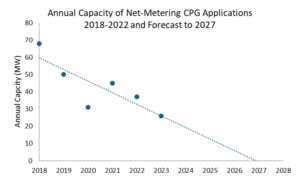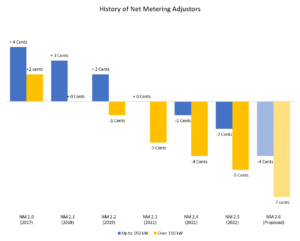The Public Utility Commission issued its final order in the net-metering biennial update on May 30th and as expected, adopted the Public Service Department’s recommendation to reduce the net metering adjustors for all new systems by 2 cents/kWh.
These cuts represent the seventh reduction to net metering compensation since 2017, a period that has seen a 32% drop in net metering installations.


During the update proceedings, REV organized a letter signed by more than 50 House members urging the PUC to reject these changes. The PUC opted to ignore this unprecedented message from the Legislature.
Vermont environmental groups Sierra Club, 350VT, VNRC, VPIRG, and Conservation Law Foundation joined with REV in opposing this decision. “The timing of this decision – and the ramifications of it at this unique moment – is unfortunate,” said Johanna Miller, energy and climate program director at the Vermont Natural Resources Council. “The Inflation Reduction Act is just ramping up, offering unparalleled opportunities to help more Vermonters invest in solar in some of the best places to site it – where people live and use energy.”
PUC’s ruling exacerbates inequity in access to solar power
REV’s comments to the PUC state, “Net-metering was created as a mechanism to empower Vermont ratepayers to self-generate clean, renewable energy and increase consumer choice in the context of Vermont’s vertically integrated utility environment. 30 V.S.A. § 8010(c)(1)(E) mandates that the net-metering rule must ensure ‘that all customers who want to participate in net-metering have the opportunity to do so.’ Net-metering rates that make self-generation financially inaccessible deprive Vermonters, and especially low- and moderate-income Vermonters, of a meaningful opportunity to participate in the net-metering program.”
Rate Change is Small Savings for Ratepayers, Large Loss for New Solar Adopters
Since the reduction to the adjustors that the PUC approved will only impact the compensation received by net-metering systems that applied for a CPG between 7/1/2024 and 6/30/2026, the change will provide minimal benefit to Vermont ratepayers at large. Assuming that 52 MW of NM 2.6 systems are ultimately installed (consistent with 2023 NM 2.5 CPG applications) reducing the compensation provided for this power by 2 cents/kWh will save Vermonters just 23 thousandths of a cent/kWh7 or less than $2/year for a household with a 700 kWh/month usage.
However, reducing the value of every kWh generated by 2 cents will decrease the total compensation generated by a 7 kW system by $4,292 over the life of the system- a significant increase in the payback period for most homeowners.
PSD fails to detail the “cost shift” from net metering and mischaracterizes net metering trends
REV noted in its comments to the PUC that, “The Department’s primary rationale for reducing net-metering compensation is that it believes that net-metering results in a cost shift that adversely impacts non-participating customers. However, the Department failed to conduct a comprehensive assessment of the benefits that ratepayers receive from net metering and, as a result, failed to substantiate its assertion that net metering results in a cost shift.”
REV further noted that in each of the last three Biennial Updates, “the Department glossed over declines in net metering to characterize net-metering deployment as essential flat (“the capacity of installed net-metering over the previous three years has been relatively constant” in 2020, “at a pace roughly in line with previous years” in 2022, and “steady compared to the prior biennial” in 2024). During the period which the Department characterized as “relatively constant”, “in line with previous years” and “steady”, the capacity of annual net metering CPG applications has fallen by 62% since its peak and annual installed net metering capacity has fallen by 39%.”
